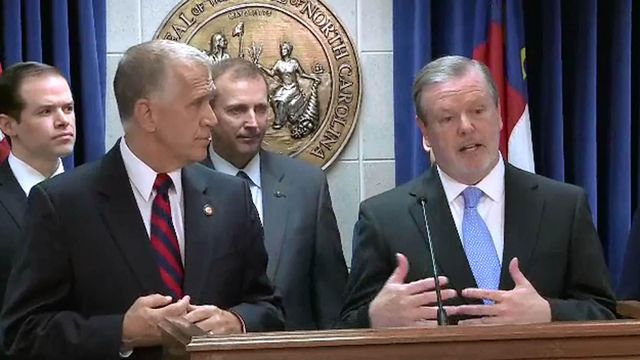House, Senate leaders outline budget deal
House Speaker Thom Tillis and Senate President Pro Tem Phil Berger provided more details Tuesday on a budget deal they say is all but printed and proofread.
Posted — UpdatedBoth Tillis and Berger took pains to credit budgets from the past two years, during which they took political fire for paring back education and other state spending, with allowing them to do what they described as "the biggest teacher pay raise in the state's history."
Teachers will get an pay raise that amounts to 7 percent on average this year. The budget also boosts early career teacher pay to a minimum of $35,000 per year by the 2015-16 school year..
Teaching assistants and other non-certified school employees are due to get a $500 pay raise under the plan, while rank-and-file state employees would get a $1,000 pay raise and five bonus vacation days, the lawmakers said.
The state's fiscal year started on July 1, but operations did not stop because the legislature passed a two-year budget in 2013. However, school districts and local governments have already had to set their budgets for the fiscal year and have watched nervously as deliberations continued.
Democrats objected to the process used to push through the budget. While Republican leaders were trumpeting the measure, members of the public and rank-and-file members of the General Assembly knew few of the details. Votes are expected on the plan later this week, just before the close of session.
"They’ll ram that through both chambers and then they’ll go home and say 'Look what a great job we did,'" said Rep. Susan Fisher, D-Bumcombe. "And that’s what they’re gonna do before the public even knows what’s in the bill."
Other provisions concern film grants, economic development
Without the full budget bill to review, it's impossible to say for sure how all of the provisions will fit together or determine the source of funding for salary boosts. Lawmakers typically use news conferences to play up portions of the bill they want voters to know about, while leaving some of the gorier details for others to dig for once the document itself is filed.
That said, here are details of the provisions outlined Tuesday:
Another $24 million in funding for teaching assistants was made "non-recurring," meaning next year's legislature will have to act or it will expire. That money, Berger and Tillis said, went to pay for things other than teaching assistants.
The grant program may be something of a placeholder.
"The film tax credit was always a political football," Tillis said. "We've got something, if we can figure out a way to make our members comfortable with it, to make it clear that the citizens of North Carolina are getting a net benefit for it. Then, I think those are the kind of discussions we can have next year."
Like the film credit that is expiring, the historic credits cut against the efforts to reform the tax code that lawmakers passed last year. Tillis credited Sen. Bob Rucho, R-Mecklenburg, and Rep. Julia Howard, R-Davie, with pushing for the credits expiration.
Skeptics remain
Should lawmakers pass the budget later this week, it is unclear what Gov. Pat McCrory would do. He has said on several occasions that he would veto budgets that rewrite Medicaid eligibility – something that is not a feature of this budget – or cut funding for teaching assistants, and he expressed skepticism about offering teacher raises of anything more than 6 percent.
However, a spokesman for the governor said Monday that it would be "premature" to comment on this current budget outline.
Other critics were less restrained despite not having seen the full scope of the budget.
"Budget writers are moving forward with a budget framework that is unsustainable and fiscally irresponsible," said Alexandra Forter Sirota of the liberal-leaning Budget and Tax Center. "They ignored the state’s revised revenue estimates, which show that the tax cuts passed last year are costing the state much more than lawmakers previously claimed, while primarily benefiting wealthy taxpayers and profitable corporations, not average people."
House Democrats were also critical of the tax deals impact on the budget.
"We know why we’re here today. It’s because of the giveaways we did. We gave them to out of state corporations We gave tax breaks to millionaires and we knew that we didn’t have the revenue." said House Minority Leader Larry Hall, D-Durham. "Yet and still, we made those decisions."
Without the tax cuts, estimated to cost the state more than 680 million dollars this year, Hall said Republican leaders wouldn't have had to choose between funding health programs and teacher raises. They've have had money to do both.
"Out of state corporations and millionaires – they’re getting the gold mine," Hall said. "Citizens of North Carolina regarding education and health care - they’re getting the shaft."
Gov. Pat McCrory said as recently as Friday that he would veto any budget plan that cut teaching assistants or Medicaid eligibility to pay for teacher raises beyond 6 percent.
Both Berger and Tillis preside over supermajorities, which gives them the power to override a veto at will if their caucuses agree.
Berger and Tillis said they're "optimistic" that the governor will approve of their spending plan. But they also revealed that he wasn't privy to the negotiations that produced the weekend deal.
McCrory spokesman Josh Ellis said the governor is reviewing the proposal.
"There are several major issues that are being worked on, including Medicaid eligibility, to hopefully avoid a veto," Ellis said Tuesday night. "We appreciate the ongoing dialogue."
• Credits
Copyright 2024 by Capitol Broadcasting Company. All rights reserved. This material may not be published, broadcast, rewritten or redistributed.






